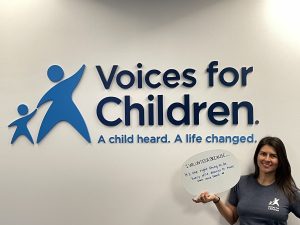 Lily Galiano with her family. Courtesy photo
Lily Galiano with her family. Courtesy photo
If you think the motherly love stops after having four children, think again. Galiano is a proud Court Appointed Special Advocate, a volunteer role that advocates for foster youth.
Galiano, a Navy veteran, said she felt compelled to become an advocate for foster youth after seeing advertisements about Voices for Children, a nonprofit that supports abused, abandoned, or neglected children by providing them with trained Court Appointed Special Advocates.
“I didn’t realize the foster system was in need for advocates,” said Galiano, who has been a volunteer for three years. “I didn’t even know they existed. Once I learned about the opportunity to help kids in the foster system, I knew I had to volunteer. As a mother myself, the thought of being able to help children and choosing not to [because of time, work or other potential hardships] wasn’t an option anymore.”
In 2021, there were an estimated 3,700 San Diego County children in foster care each year, but only 2,100 received the support of a CASA volunteer. In Riverside County, the numbers were worse with 4,000 children in foster care but only 430 with CASA advocates. As the largest CASA group in California, Voices for Children is working to help as many children as possible.
In 2019, Galiano was assigned two siblings who knew little English. As the first U.S.-born child to immigrant parents, Galiano said she knew firsthand the challenges of learning a new culture and language. After supporting them, the children now receive language development resources to thrive at school. One child has since been reunited with family while the other remains in Extended Foster Care. Galiano continues to work with the child.
 Lily Galiano. Courtesy photo
Lily Galiano. Courtesy photo
Although Galiano has supported the children over the years, she said she has benefitted from being a volunteer too.
“I realized in supporting them, I was supporting a part of myself that I didn’t know needed support,” Galiano said. “I’ve learned so much about myself since I became a CASA volunteer. It’s been a personal journey, while also helping the children in the case grow and prosper.”
Being a CASA volunteer has also served as a learning experience for her own children.
“I told my biological children that there are some children who need a positive figure in their lives,” she said. “I explained possible reasons why children are in foster care and how having a friend like me in their lives can make a difference to them.”
Galiano, who finds inspiration from people like Ruth Bader Ginsberg, said she plans to be a volunteer for foster youth for as long as possible because it’s one of the “best decisions” she’s ever made.
Interested in being a CASA volunteer? Here are the requirements:
- Be at least 21 years of age
- Commit to seeing their case child(ren) at least once per month
- Make at least an 18-month commitment to the program
- Have a valid driver’s license
- Clear a criminal background check and DMV record check
- Be willing to drive to a variety of locations throughout San Diego or Riverside County
- For the protection of the children, be able to maintain confidentiality and professional boundaries
Here’s what you’ll do as a CASA:
- Act as fact-finders and provide the court with information about the child.
- Gather information from court documents, social workers’ files, and educational, medical and therapy records.
- Assist the social worker in identifying issues important to the child.
- Speak with the child, family members, school officials, health care providers, and other professionals involved in the child’s life.
- Facilitate visits between siblings.
- Maintain a consistent and supportive relationship with the child.
- Participate in the child’s education and contribute to educational decisions, often holding educational rights.
- Make recommendations regarding the child’s best interests in a written court report, which is completed with the support of their VFC staff supervisor.
- CASAs visit with their case children at least once a month, but often more frequently. This provides the children with stability and consistency, and allows the CASAs to better understand the needs of the children, as well as their hopes and dreams. Some CASAs build and maintain positive, trusting relationships with their case children, much like mentors. With just 10-15 hours a month, a CASA can make a real difference in the life of a child.
Finally, here’s proof that CASA volunteers make a real impact:
- Children in foster care with CASAs are more likely to be adopted.
- Children with CASAs are less likely to re-enter the child welfare system.
- Children with CASAS tend to receive necessary services sooner, for a longer duration, and more consistently.
- 20% more children with CASAs passed all school courses and were significantly less likely to be expelled.
- Children with CASAs scored significantly higher than other children in foster care on protective factors scales such as sense of acceptance, positive attitude for the future, and ability to work with others.
For more information about Voices for Children or to become a CASA volunteer, go to speakupnow.org.
San Diego Moms is published every Saturday. Read past San Diego Moms columns here. Have a story idea? Email [email protected] and follow her on Instagram at @hoawritessd.
